Diabetes Crises in Pakistan: A Call for Action
Diabetes, also known as a silent killer, is unfortunately a leading cause of death worldwide. The disease primarily occurs due to high blood sugar levels in the body. Either your body doesn’t produce enough insulin or cannot effectively utilize it.
Several forms of diabetes are present. Mellitus Type 2 diabetes, in which insulin production is low, is the most common. Over time, diabetes can turn into a chronic disease, causing multiple health complications.
Diabetes in Pakistan
The prevalence of non-communicable diseases in Pakistan is deeply concerning, and diabetes is at the forefront. According to the International Diabetes Federation (IDF) Diabetes Atlas 2024, Pakistan ranks third globally in diabetes prevalence among adults aged 20–79.
Currently, approximately 34.5 million adults in Pakistan are living with diabetes. Even more alarming is the fact that nearly half of these individuals remain undiagnosed, increasing the risk of long-term complications. This dramatic rise from previous years signals an urgent need for effective interventions and consistent awareness campaigns.
Low- and middle-income countries like Pakistan are experiencing the fastest growth in diabetes cases. Without preventive action, projections suggest Pakistan’s diabetic population could reach 70 million by 2050.
Rural and Urban Population in Pakistan
In Pakistan, around 61.4% of the population lives in rural areas, while the remaining 38.6% resides in urban centers. Unfortunately, the rural population faces significant barriers in accessing healthcare, including diagnostic testing and consistent medical guidance.
Worsening the situation is the economic crisis. According to recent estimates, over 40% of Pakistanis now live below the poverty line. Rising inflation and limited employment opportunities have pushed millions into economic hardship, depriving them of basic necessities. In such circumstances, healthcare becomes a secondary concern, and many individuals with diabetes go undiagnosed.
This lack of diagnosis can lead to severe complications like nerve damage, stroke, kidney problems, and even cancer. Without early detection, managing these conditions becomes even more challenging.
National Action Plan
To prevent diabetes and other non-communicable diseases, a National Action Plan was created in Pakistan. It aimed to control diabetes cases in the country through awareness, education, and medicine. However, the strategies failed to be implemented as planned due to a lack of resources in the rural areas.
In February 2023, healthcare experts once again emphasized the urgency of the diabetes crisis in Pakistan. They called for a renewed action plan and highlighted a disturbing trend that young adults between the ages of 25 and 30 are increasingly being diagnosed with diabetes.
Reasons Behind the Alarming Diabetes Surge
To control the growing number of diabetes cases, you must first understand the core reasons behind it. Considering the living patterns and income level in Pakistan, the following factors can contribute to developing diabetes:
Poor Lifestyle
In Pakistan, people have limited access to sports and athletic activities. You can hardly find any properly maintained walking track. Especially when it comes to the rural side, you cannot find people routinely involved in sports activities.
The poor population of Pakistan spends a major part of their day earning bread and butter. They do not get enough time for health and fitness. Apart from this, the social and cultural norms become a hindrance in bringing change to their lifestyle.
Most women cannot walk outside their houses without being accompanied by a male family member. Likewise, running, jogging, and exercising are considered next to impossible.

Lack of Awareness
Pakistan’s literacy rate stands around 62–64%, with significant disparities between urban and rural populations. This low literacy level directly affects health awareness. Most people are not aware of the right food choices. Full-fat dairy, added sugars, and excessive oil are common in their diet. All such things increase the probability of getting diabetes.
Furthermore, they are unaware of the symptoms associated with diabetes. For healthcare, they consider a nearby Hakeem. Getting diagnostic testing is difficult for them. Even if the facility is available, they consider it unnecessary.
Likewise, when it comes to obesity, which can also cause diabetes, they treat it as a sign of good health. Unfortunately, they are not aware of the negative consequences of being obese.
Non-Diagnosis and Lack of Treatment Options
Due to poor healthcare infrastructure in rural Pakistan, diabetic patients are often not diagnosed. Nearby clinics do not have testing facilities. Besides this, non-availability of medicines is another common concern.
The healthcare providers in such areas are also not educated enough to guide the illiterate population. In some clinics, the staff does not even know the difference between random and fasting blood sugar level tests.
How to Help the Underserved Communities Combat the Silent Disease
Curtailing the number of undiagnosed cases in the rural population requires a comprehensive plan. Here are a few useful strategies for it:
Education and Awareness
Educating people, especially females, regarding the symptoms of diabetes and the significance of screening tests for diabetes
Helping them understand poor dietary options
Convincing them to lead an active lifestyle
Highlighting the impact of obesity
Showing the consequences of diabetes
Counselling to quit unhealthy habits like smoking and use of tobacco
Diagnostic Testing and Other Facilities
Conducting free screening tests
Reminding about follow-ups through text messages
Increasing the number of diagnostic testing facilities
Offering free medicines for diabetes management
Providing diet plans
Diabetes Awareness Month
Every year, November is observed as Diabetes Awareness Month. It is the time when different communities, healthcare institutes, NGOs, and individuals come together to spread awareness. Special campaigns are also launched on International Diabetes Day, which is celebrated on 14th November.
YOU can Help Eradicate Diabetes!
Shine Humanity plays an active role in spreading diabetes awareness and arranging screening camps. Our screening camp at Chilya was also arranged for this purpose.
Join hands with our team and play an active role in diabetes eradication. You can either donate or offer free services. Together, we can create a diabetes-free Pakistan.
